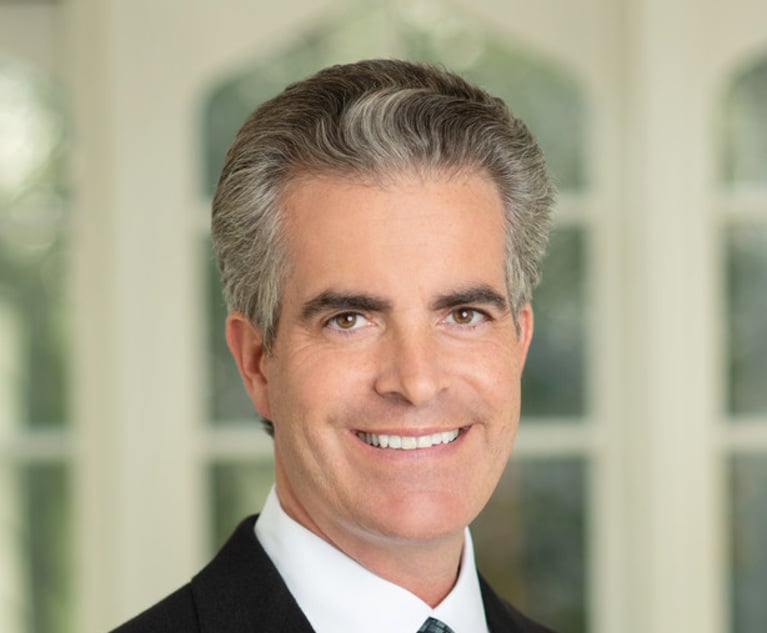 Photo: Shutterstock
Photo: ShutterstockJudge Comes Down on TJ Maxx for Allegedly Destroying Evidence in Injury Case
"This reinforces the importance of requesting all applicable video surveillance on behalf of our clients at the onset of representation," plaintiffs counsel said.
April 08, 2020 at 04:12 PM
5 minute read
A federal judge has drawn an adverse inference against retailer TJ Maxx's inability to produce video surveillance evidence in a personal injury case involving a slip-and-fall at one of its stores.
U.S. District Judge Darnell Jones II of the Eastern District of Pennsylvania denied TJ Maxx's request for summary judgment in plaintiff Natalia Charoff's lawsuit. Charoff had argued that several disputed issues remained, including her allegation that TJ Maxx destroyed video evidence of her accident.
According to Jones' April 7 opinion in Charoff v. Marmaxx Operating, the defendants argued that there was no video surveillance of the incident as the location where Charoff slipped on liquid was in a "blindspot." Charoff contacted the defendants' insurer, Zurich American Insurance, asking to preserve video evidence.
Additionally, store manager Joeval Warner testified that standard procedure was to contact Zurich, which would have subsequently put the store on notice to provide video. Loss prevention manager Keith Martin said he was unsure if Zurich asked for the video evidence since he was unable to access his email, according to Jones.
"This court draws an adverse inference from defendants' failure to produce surveillance videos, and infers that defendants failed to do so 'out of the well-founded fear that the contents would harm [them],'" Jones said. "Defendants point to no evidence that suggests Zurich failed to contact them to obtain the videos. Based on Martin's testimony, it would have been standard protocol for Zurich to reach out to him after it received a preservation letter."
Jones continued, "This court finds unavailing defendants' argument that plaintiff only sought video of the precise spot where she fell; defendants base their position on semantics. Plaintiff's interrogatories sought video from 'the location where the alleged accident occurred[,]' which could easily be read to refer to the store itself.
"Assuming arguendo that defendants' reading of the interrogatory is accurate and it refers only to the precise location of the accident, plaintiff's preservation letter was explicitly broad in scope, and it should have caused defendants to preserve video of other parts of the store. Specifically, the letter sought video 'of the location where this trip and fall occurred, and the surrounding areas in [sic] the location (from all camera angles) even if you do not capture the actual fall.'"
TJ Maxx is represented by Mark Lockett of Bonner Kiernan Trebach & Crociata, who did not respond to a request for comment.
The plaintiff's attorney, Neil Hoffman of Hoffman, Sternberg, Karpf & Lynch, said in an email, "We were reasonably confident the court would come to its rationale and conclusions based upon the specific circumstances of this case as well as the applicable case law. This reinforces the importance of requesting all applicable video surveillance on behalf of our clients at the onset of representation."
Preservation of surveillance video is an issue that comes up often in personal injury cases.
In March, the Pennsylvania Supreme Court declined to review a Superior Court ruling that a grocery store spoliated evidence when it deleted portions of a surveillance video the plaintiff had requested in a slip-and-fall case, letting stand a precedential decision that one civil litigator said should give pause to business owners and lawyers on both sides of the courtroom aisle.
In Marshall v. Brown's IA, a three-judge Superior Court panel in March 2019 ordered a new trial for plaintiff Harriet Marshall because the Philadelphia Court of Common Pleas judge who oversaw her first trial failed to give the jury an adverse inference instruction based on defendant ShopRite's spoliation of evidence.
ShopRite preserved only about 37 minutes before and 20 minutes after Marshall's fall, despite receiving a letter from Marshall's attorney two weeks after the incident requesting footage of the six hours before and the three hours after the fall, the court said.
Litigator Mark DiAntonio of McCann Law in Philadelphia, who was not involved in Marshall but has previously written about the potential ramifications of the case, said he was surprised the Supreme Court denied allocatur because the Superior Court's ruling is likely to make discovery more arduous in injury cases and create more work for trial courts.
Philadelphia's Discovery Court Program, for example, may see more activity, as parties wrangle over the scope of surveillance video requests.
"The message that's sent [by the Marshall decision] is 'when in doubt, make a really broad request and make the camera owner either comply or refuse or give something less than everything you're asking for and then go to discovery court and state your case,'" DiAntonio said. "I can see a lot more trips to discovery court as a result of that. There's really no incentive for the requester to limit their request."
Read More
This content has been archived. It is available through our partners, LexisNexis® and Bloomberg Law.
To view this content, please continue to their sites.
Not a Lexis Subscriber?
Subscribe Now
Not a Bloomberg Law Subscriber?
Subscribe Now
NOT FOR REPRINT
© 2024 ALM Global, LLC, All Rights Reserved. Request academic re-use from www.copyright.com. All other uses, submit a request to [email protected]. For more information visit Asset & Logo Licensing.
You Might Like
View All

Pittsburgh Judge Rules Loan Company's Online Arbitration Agreement Unenforceable
3 minute read
Phila. Jury Awards $15M to Woman Who Slipped on Apartment Building Stairs
4 minute read
Pa. Hospital Agrees to $16M Settlement Following High Schooler's Improper Discharge
4 minute readLaw Firms Mentioned
Trending Stories
Who Got The Work
Michael G. Bongiorno, Andrew Scott Dulberg and Elizabeth E. Driscoll from Wilmer Cutler Pickering Hale and Dorr have stepped in to represent Symbotic Inc., an A.I.-enabled technology platform that focuses on increasing supply chain efficiency, and other defendants in a pending shareholder derivative lawsuit. The case, filed Oct. 2 in Massachusetts District Court by the Brown Law Firm on behalf of Stephen Austen, accuses certain officers and directors of misleading investors in regard to Symbotic's potential for margin growth by failing to disclose that the company was not equipped to timely deploy its systems or manage expenses through project delays. The case, assigned to U.S. District Judge Nathaniel M. Gorton, is 1:24-cv-12522, Austen v. Cohen et al.
Who Got The Work
Edmund Polubinski and Marie Killmond of Davis Polk & Wardwell have entered appearances for data platform software development company MongoDB and other defendants in a pending shareholder derivative lawsuit. The action, filed Oct. 7 in New York Southern District Court by the Brown Law Firm, accuses the company's directors and/or officers of falsely expressing confidence in the company’s restructuring of its sales incentive plan and downplaying the severity of decreases in its upfront commitments. The case is 1:24-cv-07594, Roy v. Ittycheria et al.
Who Got The Work
Amy O. Bruchs and Kurt F. Ellison of Michael Best & Friedrich have entered appearances for Epic Systems Corp. in a pending employment discrimination lawsuit. The suit was filed Sept. 7 in Wisconsin Western District Court by Levine Eisberner LLC and Siri & Glimstad on behalf of a project manager who claims that he was wrongfully terminated after applying for a religious exemption to the defendant's COVID-19 vaccine mandate. The case, assigned to U.S. Magistrate Judge Anita Marie Boor, is 3:24-cv-00630, Secker, Nathan v. Epic Systems Corporation.
Who Got The Work
David X. Sullivan, Thomas J. Finn and Gregory A. Hall from McCarter & English have entered appearances for Sunrun Installation Services in a pending civil rights lawsuit. The complaint was filed Sept. 4 in Connecticut District Court by attorney Robert M. Berke on behalf of former employee George Edward Steins, who was arrested and charged with employing an unregistered home improvement salesperson. The complaint alleges that had Sunrun informed the Connecticut Department of Consumer Protection that the plaintiff's employment had ended in 2017 and that he no longer held Sunrun's home improvement contractor license, he would not have been hit with charges, which were dismissed in May 2024. The case, assigned to U.S. District Judge Jeffrey A. Meyer, is 3:24-cv-01423, Steins v. Sunrun, Inc. et al.
Who Got The Work
Greenberg Traurig shareholder Joshua L. Raskin has entered an appearance for boohoo.com UK Ltd. in a pending patent infringement lawsuit. The suit, filed Sept. 3 in Texas Eastern District Court by Rozier Hardt McDonough on behalf of Alto Dynamics, asserts five patents related to an online shopping platform. The case, assigned to U.S. District Judge Rodney Gilstrap, is 2:24-cv-00719, Alto Dynamics, LLC v. boohoo.com UK Limited.
Featured Firms
Law Offices of Gary Martin Hays & Associates, P.C.
(470) 294-1674
Law Offices of Mark E. Salomone
(857) 444-6468
Smith & Hassler
(713) 739-1250





